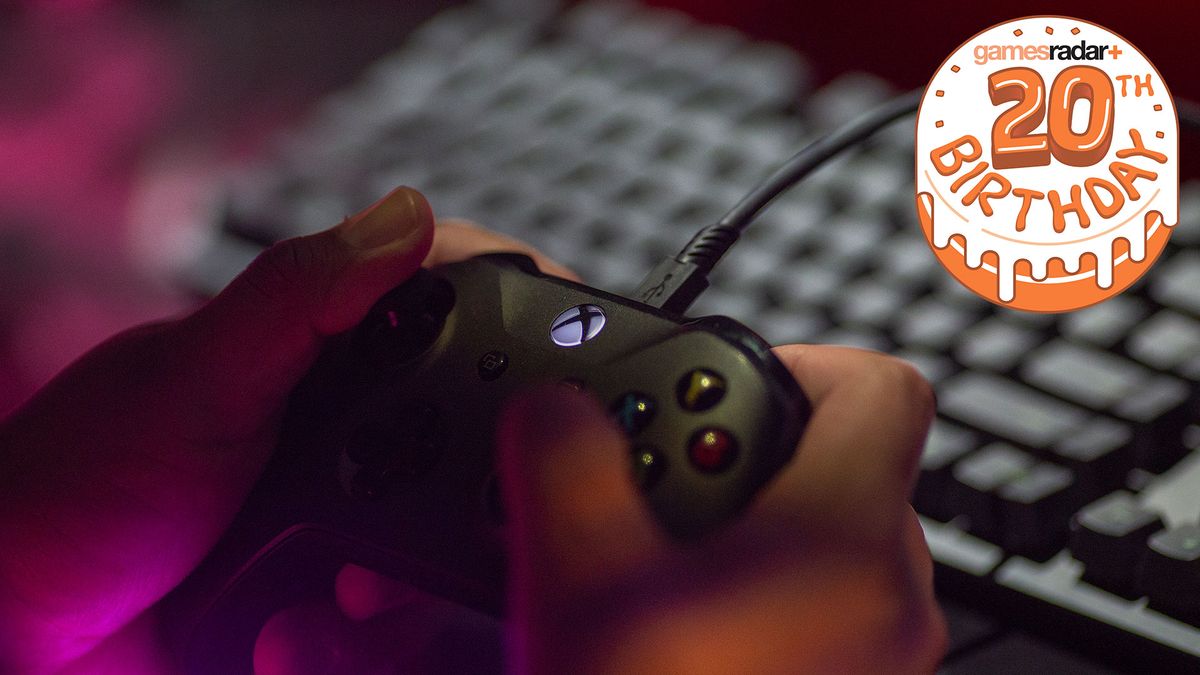
The video game industry has undergone a wild transformation since August 1999, which is when GamesRadar first started out. Do you think that the industry pioneers – those that were there at the time, defining the shape of the industry as it exists today – could ever have imagined that it would be like this? That the barriers between platforms would be broken down. That players would be connected to millions of other players around the globe, enjoying games without limit or restriction. That game worlds, density and detail would improve so rapidly; that we'd blow through the HD-era and be looking at new frontiers of graphical fidelity as 4K art assets become standardised and motion capture becomes an ever-important driver behind animation. That we would have virtual reality headsets in our living rooms, be able to stream games from an invisible network, that… Video games have come such a long way, it would be impossible to name all of the improvements that we've seen arrive in the last 20 years.
Still, it's fun to imagine what it would be like from 20 years from today, wouldn't it? So to celebrate GamesRadar's 20th birthday, we asked developers what they think video games and the industry that surrounds it will be like in 2039? It's an impossible question to answer, but that's half the fun of it. GamesRadar took it to the developers, to have them reflect on how far gaming has come since 1999 and to imagine where it might be in 2039.
And after these conversations, well, me tell you: we haven't seen anything yet.
Melissa MacCourbey, narrative director of Assassin's Creed Odyssey – "2039, here we come"
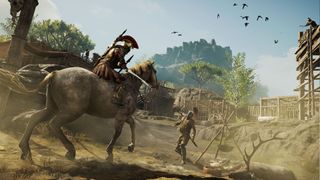
From scriptwriting intern to narrative director of one of the biggest games in the industry in just six years, Melissa MacCoubrey is certainly one to watch as we look towards the future of the games industry. Following the release of Assassin's Creed Odyssey, MacCourbey is stationed at Ubisoft Quebec, no doubt dreaming up the future of interactive storytelling. She's happy to share but a little hint of that here.
“I can’t tell you what our games and play-spaces will be like in 20 years, but I can tell you what we need them to be. Games have done incredible things for people since their creation. Experiences, the janky and the polished, have provided both players and developers with a sense of escapism, comfort, safety, ability, and even friendship. I have had the immense joy of being able to create games through Ubisoft that have embodied these traits. I have seen the grim underbelly of the games industry, too."
"In 20 years, we need to have learned our lessons – developers, companies, and players alike. We need to have learned to prioritize happiness, kindness, and most of all empathy, in design, in our communities, and to one another. Games can be a powerful tool for self-acceptance, and communication. They reach and must continue to reach people of all types – no matter who you are on the spectrum of life, no matter what you look like. I have been fortunate to work on a franchise that has placed that sentiment next to its title screen. This is a lesson that will live with me for the rest of my life. Games have become a centerpiece in our lives, in our culture, and will only continue to expand their influence. They have the potential to let you be whoever you want to be. This is the human imagination at its finest, and we as enthusiasts must give the industry that room for growth."
"As the song the Circle Game states, 'We can’t return, we can only look behind from where we came', so let us surge forward into the horizon of positive change. 2039, here we come.”
Sign up to the 12DOVE Newsletter
Weekly digests, tales from the communities you love, and more
Ashraf Ismail, creative director at Ubisoft Montreal – "Wce are seeing new experiences, new genres and new ways to play"
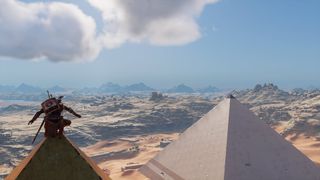
Ashraf Ismail is a creative director at Ubisoft Montreal, working on an unannounced project. Ismail is perhaps best known for his work overseeing the transformation of one of the biggest franchises in the world, following his work as game director on Assassin's Creed 4: Black Flag and Assassin's Creed Origins.
"I think what we’ll see in the next 20 years is not necessarily a transformation of the industry or the games we make/play but rather an expansion. What we’ve seen in the last five to 10 years is new platforms, new hardware and new technology patterns that have expanded the audience, expanded where and how we can play but also the types of experiences we can make. But I don’t believe it has replaced anything (hence, expand rather than transform). We are still making all the types and genres of games the industry has been making for the last 20 years. They are getting more sophisticated and we are constantly learning to master our craft. But now we are seeing new experiences, new genres and new ways to play additional to what we already have."
"Streaming will become the main way games are accessed, VR and AR will continue to grow, as well as mobile. But I believe the biggest new expansion will come through AI. How AI will be used as a game feature but also how it will be used to produce content externally and internally to the game."
Lottie Bevan, co-founder of Weather Factory – "I bet China has a lot to say to the western gaming landscape"
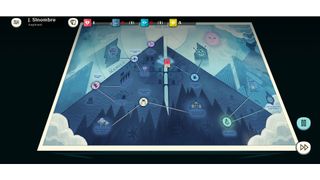
From Fallen London to Cultist Simulator, Lottie Bevan has overseen production on some of the most interesting new games out of the UK, first at Failbetter Games and then later as co-founder of Weather Factory. Lottie is currently working on Book of Hours, combat-free RPG set in an occult library that looks bloody wonderful.
"I think we’ll see a greater number of AR multiplayer games like Pokemon Go, as wearable tech reaches Black Mirror levels of convenience and ubiquity. Sadly, I don’t have high hopes for VR!"
"I also expect us to see more female characters, less gender-specific genres and a wider rainbow of ethnicities, as traditional userbases shift from first-world white men to a wider, global population of gamers."
"Finally, I bet China has a lot to say to the western gaming landscape. In 20 years’ time there’ll be better bridges between eastern and western audiences, and western developers will have increasing financial incentive to incorporate Chinese tastes. So look out for Honor of Kings 5, featuring Samoan-Cantonese protagonist Lady McPhee, coming to Google Glass in Q4 2039. I bet you a fiver."
Yoko Taro, game director of Nier: Automata – "I couldn’t really care less about this as I’ll probably be dead by then"
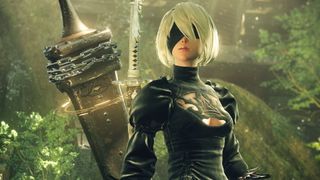
You know Yoko Taro. His face, often shrouded by a mask; his games, as super weird as they wildly ambitious. Taro-san, fresh off of directing Nier: Automata and contributing a truly excellent scenario to Final Fantasy 14: Shadowbringers in YoRHa: Dark Apocalypse, found the time to plot out the future of the industry – it's as out of control as you'd expect it to be.
"Development of the internet has allowed people to discover their own personal value online."
"The current situation in which people fight to collect more followers and likes will undoubtedly only accelerate. This suggests to me that it is likely that the number of people who use the internet just to kill time or to post a comment anonymously will decrease, and the number of people who take online actions in the interest of self-investment will increase. Video games are now a part of this value cycle, and everything to do with them – such as making, buying, playing, and commenting on them- will be capitalized upon."
"On the other hand, certain characteristics of video games, such as the comfort and enjoyability they offer, as well as their ability to engage players, will likely be utilised in other systems ranging from corporate management and education to other serious infrastructural services. The various attributes of games will be used in systems that are no longer considered games, in a similar way to how social media is used now. With that said, in the future, I predict that the line dividing what is a game and what is not a game will become much more ambiguous – but, I couldn’t really care less about this as I’ll probably be dead by then. Goodbye."
Moo Yu, programmer on Knights and Bikes – "I expect making games to be as approachable as making YouTube videos today"
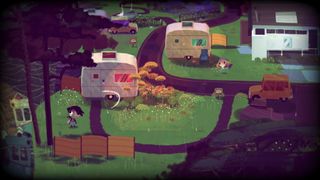
From Insomniac Games to Media Molecule to Foam Sword, Moo Yu has been responsible for building games that are fun for all the family. Taking his past experiences working on Ratchet & Clank and LittleBigPlanet, Moo is now hard at work on Foam Sword's debut, Knights & Bikes – a delightful game that you should absolutely check out, once you're done wondering about 2039, of course.
"In the year 2039, I expect making games to be as approachable as making YouTube videos today. While this will inevitably produce an endless stream of games with the quality of the average YouTube video, it'll be an incredibly exciting time when game creators and the games they create will be as varied as the people on this planet."
"I'm currently obsessed with micro documentaries. I love the ability to get a fascinating glimpse into a fundamentally different experience in a matter of minutes, but what if I was in control instead of just watching? I'd love to try the activities, venture off the beaten path, or chat to some of the background characters. When creators can invite players into the worlds of their consciousness – whether that be the real world they live or the worlds of their deepest hopes and darkest fears. I look forward to this future of empathy and widened eyes through games rather than the genericized animosity of battles against orcs, aliens, and foreigners."
Lydia Andrew, audio director at Ubisoft Quebec – "Technological changes will alter how we access games"
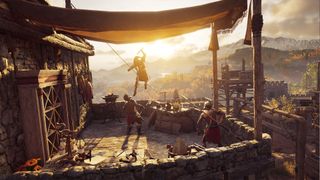
Lydia Andrew has been involved with the particulars of editing sound since 1999. She's an audio director that has helped define and supervise the soundscapes, musical cues, and VO sessions of some of the biggest games in the world. Currently stationed at Ubisoft Quebec, Lydia is helping to bring a new level of audio immersion to the Assassin's Creed series.
“The increasing diversity of developers’ and players’ backgrounds will ensure the industry grows. The dividing line itself between developers and players will become increasingly fluid. With this, the nature of player experience, of identity, of narrative, of how we shape the worlds we play in will all radically evolve."
"I imagine in the future games become a destination, where you can experience what everyone else has already built, where you too can find a set of tools, and if you can imagine it - you can build it: any playstyle, any experience, without being limited by the idea of RPG or FPS or PvP. A common place. An inspiring universe. Technological changes will alter how we access games. Playing across all platforms and creating from anywhere will involve everyone in the entire ecosphere and life cycle of games. This is extraordinarily exciting.”
Jodie Azhar, CEO and game director at Teazelcat Games – "I think we’ll continue to see lifestyle influencing games"
If you've played a Total War game in the last six years, there's a good chance you'll be familiar with Jodie Azhar's work. Jodie has spent a decade in the industry working as everything from a technical animator to a technical art director – she makes the art assets work exactly like that should. While Jodie is hard at work on a new IP – her own, at Teazelcat, a studio she founded in 2018 – she managed to find the time to consider what the future of this industry might look like.
"I think we’ll continue to see lifestyle influencing games - the ease of use and accessibility of mobile devices makes it a great platform for reaching a wide audience and it’s easy to fit a bit of gaming time in between activities. We’ve only seen smartphones really take off in the last 20 years though, so who knows whether they’ll be replaced by some new device that everyone is using."
"There’s still going to be demand for titles that require more power than a mobile device to run and are played in the comfort of the home. I think we’ll still be seeing big studios focusing on the Hollywood-esque titles that they’re confident will make a profit, and still see Indie teams leading the way with more experimental themes and mechanics. But we constantly see cycles within game development, so it could be that in 20 years time we’ve seen the gap between what small, mid-size and large studios are creating shrink and then widen again as developers look for ways to be competitive."
"For all types of team I’m hopeful that we see a more mature industry that is dealing with the issues of crunch culture and providing more stable environments for developers to grow and provide players with exciting game experiences."
Clint Hocking, creative direct at Ubisoft Toronto – "I think we have a good chance of growing enough as a species to be able to confront this future successfully"
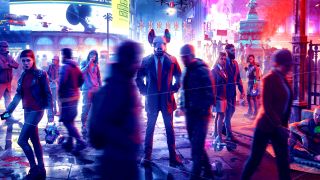
Clint Hocking hasn't shipped a game since 2008's Far Cry 2, and yet his influence is still felt to this day all throughout this industry. He's now back at Ubisoft, doing what he does best – reinventing franchise with bold ideas. Watch Dogs Legion is out in 2020, but we managed to get Clint to look beyond that and consider 2039 for a few minutes. He has hope for the future of this industry!
“Over the next 20 years, the progress of our medium will become entirely dependent on the continued progress of society as a whole. Price performance for computing will grow exponentially, meaning a massive increase in available power. Portable devices that used so much power would cause you to immolate on contact, so it will all need to reside in the cloud. Making such a device and its power accessible to a projected world population of nine billion will require solving wide-ranging societal problems like human equality, global warming, resource scarcity, infrastructure development, energy accessibility, and the arrival of AI. Failing to address those problems will mean only 1% of 1% of people will be able to afford our games."
"That means these games will have an addressable audience of only 1 million players who will all live in diamond palaces on Titan eating rare tropical fruit made from other, recycled humans. The good news is that games are the medium best suited to making complex societal challenges emotionally and intellectually accessible to humans. If we keep making games that truly matter, that challenge us to be better, then I think we have a good chance of growing enough as a species to be able to confront this future successfully. Also, I can't wait to play those games.”
Rima Brek, studio production director at Ubisoft Toronto – "Our industry is transforming at light speed"
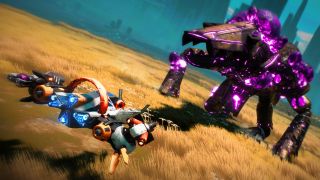
As a studio production director at Ubisoft Toronto, Rima Brek is responsible for keeping things moving – most recently on Far Cry 5 and Starlink: Battle For Atlus. She knows what it takes to take a good game and make it great, the dedication required to help facilitate future developments in this industry. What will 2039 hold for gaming? Brek hopes for many things, but a legit Holodeck is right at the top of the list and I'm right there with her on that one!
“Gaming hardware and technology has evolved tremendously over the last 20 years, allowing developers to advance the quality of our games and deliver incredibly immersive experiences for our players to enjoy with their friends. Video games are reaching a much broader audience today and the impending shift towards cloud and streaming will push that even further, making them accessible to more players.
"Our industry is transforming at light speed and it feels like the progress is still accelerating, so it’s difficult to predict five years into the future, let alone 20 years! I can’t resist hoping for some science-fiction fantasies to become reality. Star Trek did accurately predict a number of scientific innovations: tablet computers, communicators, telepresence, phasers, and replicators. Maybe 20 years will be long enough for the industry to develop a TRUE Holodeck! That would certainly allow us to take our online experiences to the next level and could redefine social hubs in video games. I cannot think of a better way to see more representation of our diverse players in video games than allowing them to play together in a gaming Holodeck.”
Paul Sage, creative director at Gearbox – "We have the tools that enable us to really make our characters have daily lives"
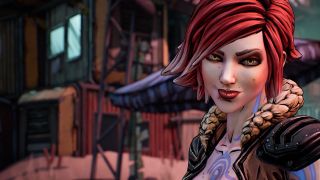
Paul Sage was working in the industry back in 1999 and that makes him a prime candidate to consider what it might be like in 2039. Sage has been instrumental in evolving cooperative game design over the years, through his work on Ultima Online and The Elder Scrolls Online; for him the future is in building better and more immersive worlds that these groups can inhabit and play in, at least, that's what he told up while taking a break from developing Borderlands 3.
"I do think that we will be less reliant on hardware, for sure. I don't know how we will get away from that, exactly, but I think that feels like an inevitability. Secondarily, I think we're kind of at a 'resolution max' in terms of what we're going to get out of high definition, so there'll instead be a focus on portability and VR. What i'm most excited about seeing, though, is the development of emergent gameplay based on player pattern learning. When you look at some of the things they're doing with AI right now in identifying cancers and so on... when you start thinking about how we could identify player patterns and creating AI which can use that data to challenge the player without just killing them - that's what i'm really excited to see. What I hope for in 20 years, then, is that developers are not worried so much about writing the details of NPC conversation or behaviour, but we have the tools that enable us to really make our characters have daily lives and investment in their worlds."
Mark Grigsby, animation director at Infinity Ward – "I hope creativity is not lost and we continue to find new ways to engage and make a lasting impact on the player"

If you've ever admired the feel and movement of characters in iconic first-person shooters like Call of Duty 4: Modern Warfare and Titanfall, you've actually been admiring the work of animation director Mark Grigsby. While Mark is a veteran of the industry, animation isn't his only claim to fame – he's also starred in the Modern Warfare games, lending his likeness and voice to SSgt. Griggs in the Modern Warfare games. And yes, he also sung "Deep and Hard" during the end credits to COD4. Grigsby is busy wrapping up work on Call of Duty: Modern Warfare, but he took the time to give us his perspective on the future of games.
"As a Cynic: A lot can happen in 20 years for the Art and Business of our industry. The new generation is brought up on bite sized pieces of entertainment; Vines came and went just like the content it created; Snapchat bite sized clips that are consumed in a day and then gone LOL. So, 20 yrs from now? Hmmmm….attention spans will be so short, and publishers will be so pressed to win that #1 spot, that all the publishers will merge into one GALACTIC entity and that will merge with Taco Bell. They will create the ultimate game called "start, hit, win". This game will be played with your eyes through AR implants. You start the game, you hit the "thing", and if you hit it you win. You can buy new skins for the game's shell every 5 mins. It will be the latest craze! The kids will love it!"
"As a Fan: The oldskool Katz like myself play or look for that creative standout game that looks fun as shit to play but captures my imagination and artistic needs. I hope I am still playing or involved in this industry in 20 yrs. I hope the graphical fidelity hits the level of realism I've been waiting for since I was a kid. I hope creativity is not lost and we continue to find new ways to engage and make a lasting impact on the player. Impacts like the first time I played Bionic Commando on the NES…. WOW, it's still one of my favourite games of all time! Impacts like Kung Fu in the arcade… Arcades in general. Impacts like "Quarter Up!" on Street Fighter II and meaning that shit like we were about to really throw hands! Impacts like GTA3… Sean Price and Royce Da 5’9” on Game Radio while I drove around Liberty City! Impacts like Metal Gear Solid! Impacts like Quake 3, Soldier of Fortune 2 and Call of Duty! Impacts like PUBG and Fortnite that have changed the “game”. The industry will continue to grow financially for sure, but we should never lose the reason we play and develop these masterpieces… to kick your damn ass. Quarter Up!"

Josh West is the Editor-in-Chief of 12DOVE. He has over 15 years experience in online and print journalism, and holds a BA (Hons) in Journalism and Feature Writing. Prior to starting his current position, Josh has served as GR+'s Features Editor and Deputy Editor of games™ magazine, and has freelanced for numerous publications including 3D Artist, Edge magazine, iCreate, Metal Hammer, Play, Retro Gamer, and SFX. Additionally, he has appeared on the BBC and ITV to provide expert comment, written for Scholastic books, edited a book for Hachette, and worked as the Assistant Producer of the Future Games Show. In his spare time, Josh likes to play bass guitar and video games. Years ago, he was in a few movies and TV shows that you've definitely seen but will never be able to spot him in.
Most Popular


